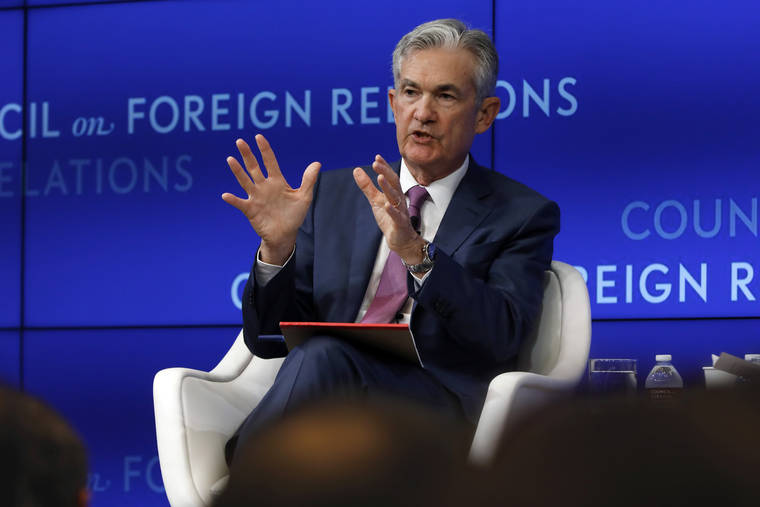WASHINGTON — Federal Reserve Chairman Jerome Powell said Tuesday the economic outlook has become cloudier since early May, with rising uncertainties over trade and global growth causing the central bank to reassess its next move on interest rates.
Speaking to the Council on Foreign Relations in New York, Powell said the Fed is now grappling with the question of whether those uncertainties will continue to weigh on the outlook and require action.
Powell did not commit to a rate cut but said the central bank will closely monitor incoming data and be prepared to “act as appropriate to sustain the expansion.”
“The crosscurrents have reemerged, with apparent progress on trade turning to greater uncertainty and with incoming data raising renewed concerns about the strength of the global economy,” Powell said.
Many economists believe the Fed could decide at its next meeting on July 30-31 to cut its key policy rate, something it has not done since 2008.
But markets showed disappointment with Powell’s comments, which suggested a rate cut was not certain. That followed separate comments Tuesday by James Bullard, head of the Fed’s St. Louis regional bank, who said that he believed a quarter-point cut in July would be sufficient as an insurance move against a possible severe economic slowdown.
In an interview with Bloomberg television, Bullard said an “insurance cut” of a quarter-point would be enough to protect against a sharper-than-expected slowdown in economic growth and a half-percentage point cut would be “overdone.” Bullard last week cast the lone dissent from the Fed’s decision to hold rates steady, favoring instead an immediate rate cut.
Trump on Monday tweeted that the Fed “blew it” by not cuttings rates at its meeting last week. At that session the Fed kept its policy rate unchanged in a range of 2.25% to 2.5% but dropped a previous pledge to be “patient” in changing rates in coming months.
Trump reportedly has considered either firing Powell or demoting him from the chairman’s job but has been told by the White House legal team that he does not have the power to do either.
Asked about the repeated criticism by Trump, Powell said, “We are human. We make mistakes. I hope not frequently but we will make mistakes. But we won’t make mistakes of integrity or character.”
Powell said that the Fed’s independence from direct political control had served the country well and when central banks do not have that protection “you see bad things happening.”
The baseline outlook for the U.S. economy remains favorable for continued growth, Powell said, but “the risks to this favorable baseline outlook appear to have grown.”
In early May, Trump more than doubled the tariffs on Chinese goods after U.S.-China trade talks broke down. The president threatened to essentially hit all Chinse imports with tariffs if China does not meet its demands for greater protections for U.S. technology.
Trump’s moves sent financial markets tumbling because of concerns the trade conflict could end the current 10-year economic expansion, which in July will become the longest in U.S. history.
Trump is scheduled to meet Chinse President Xi Jinping later this week at the Group of 20 economic summit in Japan, a meeting that is being closely watched for signals that the two sides are prepared to resume talks in search of a trade deal.
In addition to rising trade tensions, Powell said since May incoming data has raised new concerns about the strength of the global economy, noting tentative signs that investment by U.S. businesses has slowed from earlier this year.
Many Fed officials believe the case for easier monetary policy has strengthened, but “we are also mindful that monetary policy should not overreact to any individual data point or short-term swing in sentiment,” he said.
Powell said that would risk adding even more uncertainty to the outlook.
Earlier this year, economists believed the Fed would keep its key policy rate unchanged all year long after four rate hikes last year. Now private economists believe from two to four rate cuts are possible this year, although some analysts think the Fed could keep policy unchanged if trade tensions are resolved without harming the economy.


